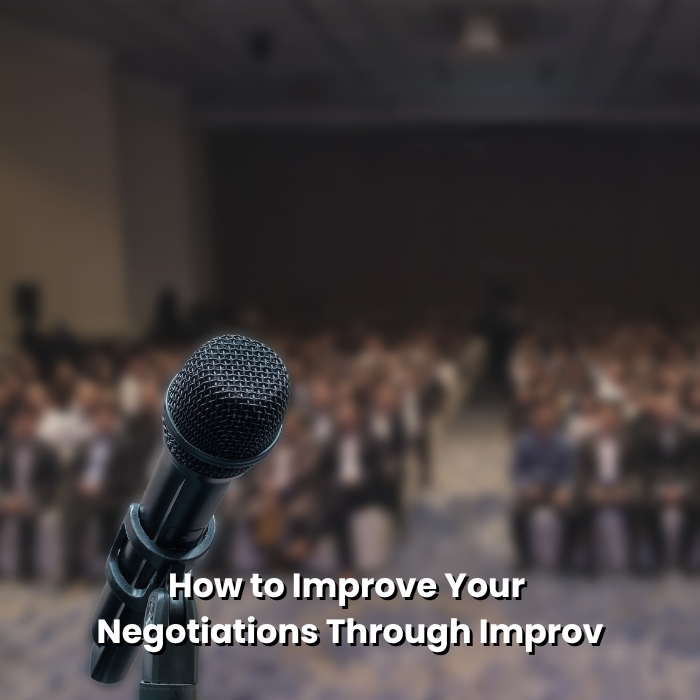
How Active Listening Makes You a More Effective Negotiator
Have you ever told a story that means something to you, only to realize the person you were speaking to was looking at their phone the whole time, not paying attention to a word you said? You probably felt like they didn’t value you or care about what was important to you. You’re not alone. It can be infuriating!
Distracted behavior in an everyday conversation is frustrating and disappointing, but during an important negotiation the consequences can be dire. This holds true for your personal and professional negotiations, whether you’re bargaining over what movie to watch with the kids or negotiating multi-million dollar business deals.
Listening intently is especially vital in professional settings where success directly depends on the ability to communicate effectively. This skill is at the heart of HERsuasion™: the Art of Feminine Negotiation. When we practice active listening, we tune out all of the distractions surrounding us, allowing us to focus on ensuring the other person feels truly heard and understood. Ultimately, this critical skill gives you the edge in any negotiation.
What Is Passive vs. Active Listening
Listening demands silence: you literally have to stop talking in order to observe the other person in the conversation. While receiving information itself requires temporarily taking on a passive role, the active part of listening refers to how you respond to that information.
Passive listening involves paying attention to the words the speaker uses (and doesn’t use), remaining open to new ideas and perspectives, reserving judgment, and devoting your attention to the speaker without anticipating when it’s your “turn” to respond. It’s harder than it sounds—especially since we’re conditioned to make immediate assumptions and judgments.
Active listening involves reflecting what someone is saying back to them to deepen your understanding and show that you’ve been paying attention. When you paraphrase a speaker’s words, ask for clarification, and remain open to feedback, you’re practicing forms of active listening.
Elevated active listening, which is a key element of HERsuasion™, kicks the art of listening up a notch. When you replay back the other person’s viewpoint to them as you understood it, be intentional about framing their point of view in the most generous terms possible. Make their argument even more eloquently or persuasively than they did themselves. While this may see counter-intuitive, it can be a powerful way to build rapport and trust, both key elements to getting better buy-in and more creative outcomes.
Strong active listeners form a thorough understanding of what other people are saying and in turn make them feel seen, heard, and understood.
How to Become a Better Listener
Becoming a better listener begins with paying attention to the person who’s talking to you. The trick here is to focus on nonverbal cues like tone of voice, body language, facial expressions, and momentum of speech. These nonverbal cues hint at the speaker’s attitude, positioning us to empathize and meet them at their level. Picking up on whether someone is frustrated, resistant, or cheerful allows us to adapt as listeners and negotiators.
Believe it or not, noticing nonverbal cues is a lot less complicated than it sounds. You know more than you think you do! Research suggests that even babies too young to master language have a basic understanding of nonverbal communication.
Beyond focusing on the speaker, be intentional with your own behaviors to show you’re engaged in the conversation even if you’re not speaking:
Show interest. The speaker wants to know you’re engaged, so use body language that demonstrates attentiveness, like leaning in, smiling, and nodding. Face the person you’re talking to directly, rather than turning away from them. Consider your arms: are they crossed or relaxed? Rely on your own body language to communicate interest but be cautious: fidgeting can be perceived as impatience, disinterest, or even disrespect, so try to keep your body fairly still.
Make appropriate eye contact. Eye contact suggests that you’re focused. Try to make consistent eye contact without lingering or staring, as that can be awkward or intimidating. Importantly, note the speaker’s eye contact. If they avoid looking you directly in the eye, they may be sensitive or uncomfortable. Shifting their gaze might better allow them to process information. The more you can observe and adapt, the better the conversation will go.
Avoid interruptions and distractions. Interruptions like clicking your pen or checking your phone immediately disrupt the flow of conversation. Remove all possible physical disruptions. Additionally, avoid imposing your views or suggestions when the speaker is still taking their turn. Interjecting your own words can throw someone off balance and distract them from completing a thought.
Be comfortable with silence. Always pause to allow the speaker (and yourself!) to collect their thoughts. Conversations and negotiations should not be verbal sparring matches: you don’t always have to jump in, reply, or comment. Providing a moment of grace can even work to your advantage. Let the other person divulge their solutions, ideas, thoughts, and concerns before you give up yours.
Accommodate different learning styles. Everyone absorbs information differently. Acknowledge auditory, visual, verbal, or kinesthetic learners by attending to their specific learning style and meeting them on their level. Some people are quick to absorb new concepts, while others may take more time to process information. Be respectful of their needs. Likewise, avoid the urge to conclude people’s thoughts and ideas for them. Trying to help somebody along might actually stifle their self-expression.
Enforce the 80/20 rule. Listen, listen, listen! As a rule of thumb, 80% of your conversation should involve you listening to the other person compared to just 20% talking. Devote the majority of your conversation to listening, observing those critical nonverbal cues, and confirming your understanding of the speaker’s point of view.
Once you’ve listened and absorbed the speaker’s ideas, look for opportunities to build onto what they’ve said before sharing your own perspective and ideas. The speaker will feel respected and heard—and that will reflect positively on your patience and empathy.
The Value of Listening in Negotiation
The most valuable tool in negotiation is the ability to truly understand the other person’s needs and desires. To get what you want, you must know what drives you (what I call your “why”) and balance that against the other person’s desires (their “why”).
An expert negotiator listens intently to the other person’s “why” and capitalizes on its intersection with their own “why.”
Traditional workplace environments celebrate a confrontational negotiation style that’s inherently combative. People make the mistake of assuming they know the other person’s intentions and then communicate without really ever listening. Neither party feels heard, minimizing the chances of reaching a solution even when one is readily available.
In my free No F.E.A.R Negotiation eBook, I outline steps to approaching negotiation without Fear, Ego, Attachment, or Reactivity (F.E.A.R). One of the classic ways Ego presents itself is talking too much instead of listening. Rambling on is troubling for a number of reasons, as it can suggest uncertainty or even monopolization of a topic. If you’re talking too much, you aren’t listening, and you certainly aren’t negotiating on the winning side.
A Salesforce survey shows that business leaders attract more support when they empower their employees by listening and making them feel heard. There are enormous benefits to demonstrating that you can listen. We all want to know that our position is being thoughtfully considered and respected!
The better you understand what someone else wants, the more skillfully you can negotiate. Practicing active listening ensures that you always know where the other party stands. Want to learn more? Download my No F.E.A.R Negotiation eBook or reach out directly for a consultation!
- How to Negotiate Problem-Solving - January 21, 2025
- Negotiate a Boost to Your Immune System - January 20, 2025
- Negotiating Tips from a Former Hostage Negotiator Isaac Betancourt - January 16, 2025






